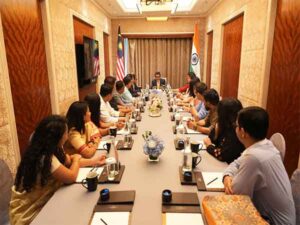Khoma village reputed to be forerunners of Bhutan’s thriving weaving culture
Thimphu [Bhutan], November 5 (ANI): Khoma village in Lhuntse is widely recognised as the birthplace of Bhutan’s flourishing weaving culture and is the melting pot of magnificent Bhutanese yarns and textiles.
According to Bhutan Live, this is the place of origin of the exquisite Kishuthara weaves, which are regarded as the best in the nation and are sold at a premium.
Situated approximately 11.5 kilometres away from the district headquarters, this picturesque village with a population of slightly over a thousand people and roughly 340 homes creates some of the best traditional silk fabrics in the nation.
Given that the area is the Wangchuck dynasty’s ancestral home, it is likely where the custom of weaving exquisite fabrics appropriate for royalty first emerged.
There’s a thumping sound to the looms as you stroll past the group of traditional cottages dotting the gentle hills of Khoma.
Typically, women work in this art and favour using the age-old back-strap loom method to weave these beautiful textiles with their intricate designs and vivid colours. The usage of locally produced silk and natural colours sourced from neighbouring forests by the weavers is becoming less common as ready-made yarns become more readily available, according to Bhutan Live.
In spite of this, the tradition of weaving Kishuthara is still very much alive in the village, and weavers take great pride in being recognised as the best in their field.
Kishuthara, a widely sought-after garment for women due to its exquisite patterns and superior quality is thought to be family heirloom. The garment was once only worn on rare events and holidays, Bhutan Live reported.
It was originally reserved for the novelties. To further broaden their product line, in addition to these textiles, they also make fabrics and accessories for daily use, such as aprons, tablecloths, mats and bags.






